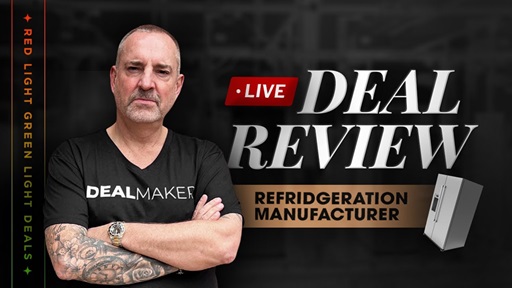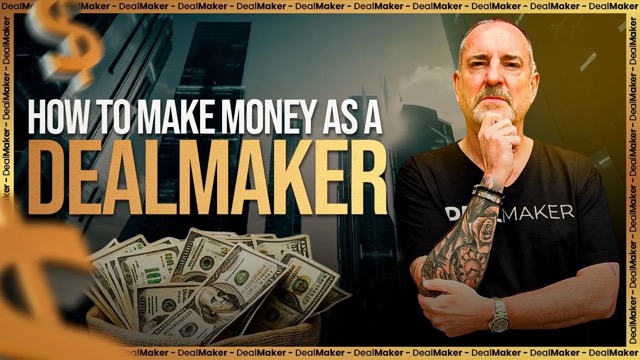Insider Tips: Financing Your Business Acquisitions!
Insider Tips: Financing Your Business Acquisitions!
This commercial real estate lending company acquisition involves two key components: a commercial bridge mortgage broker (lending) and a structured installment sales company (holding). The business is located in Idaho and has been operational for over 20 years, but the two owners—who are also the business—are looking to retire. They have structured the deal to allow them to stay involved in the business for up to five years, ensuring continuity for both clients and investors.
The lending side of the business focuses on origination fees, loan servicing fees, long-term escrow fees, and interest income from trust accounts. The holding side, which is involved in structured installment sales, has been significantly impacted by recent IRS scrutiny, causing revenues to decline. However, the holding company has historically been more lucrative, and the business owners are optimistic about the potential for a rebound once the IRS regulations stabilize. For now, the business is operating with a focus on rebuilding the lending side, which has lower operating costs and higher margins.
While the business has significant potential, there are a few key challenges, including declining revenue over the last year and the owners’ unique involvement in the business. The owners are integral to the operation, with one of them holding a vast amount of historical knowledge. This poses a risk, but it can be mitigated with proper planning to bring in key employees and ensure a smooth transition. Another challenge is the structure of the holding company, which has paused its activities due to regulatory issues.
The deal presents an opportunity to expand by cross-selling services between Idaho and Wisconsin, where the acquiring team already has a presence. There is also potential to increase revenue by utilizing two Reg D private offerings that have not been fully leveraged by the current owners. With Boise experiencing rapid growth, particularly in the commercial real estate market, there is a strong opportunity to capitalize on that expansion.
Despite these opportunities, the business faces challenges in funding due to its nature as a lending company. Commercial lenders, including SBA lenders, have been hesitant to finance a lending business. This means that acquiring the business may require raising private capital, which could slow down the acquisition process. However, with the right expertise and connections, the acquiring team is well-positioned to successfully navigate these challenges and scale the business.
In conclusion, this acquisition represents a promising opportunity to enter a growing market with significant upside potential. The business has strong industry credibility, a history of profitable operations, and a loyal customer base. With careful management, the revenue of the holding company can be restored, and the lending side can be expanded. The key to success will be mitigating the risks associated with the owners’ involvement and ensuring a smooth transition to new leadership.
Full Transcript:
Let’s go to deal three with our very good friend, mister David Horry. So, David, the floor is yours.
Yes. Excited to be here. This is mine and Jeff’s first red light green light, and we’re excited about the learnings. And we’re excited to get feedback from this group because this is different from any of the other deals that we’ve seen so far, at least come through this group. So, excited to get some feedback on this.
So, at a high level, we are working on a commercial real estate lending company acquisition.
And this acquisition involves two operating companies, and we’ll refer to them as we talk and and move forward as lending and holding to kinda differentiate them. And, and that’ll make a difference as we kind of look at the numbers.
Go ahead and click forward, please. The team, Jeff is driving this presentation, and, he is upper echelon. He has over twenty years of real estate investment experience.
He owns his own lending company in the real estate space and has fifteen years of experience with that. He he runs, four reg d funds.
And, so he brings a lot of expertise in the specific to this deal, to bear. And then, there’s me. I’ve scaled three different startups, that have exited via acquisition. And so I’m the scaling side of of things and and kind of grow focus on growth.
So a brief snapshot on the business.
There’s two real components. So, again, the lending side, what what we call refer to as lending, focuses on commercial bridge their, commercial bridge mortgage broker, and the holding side focuses on structured installment sales of commercial properties.
This is based in my area, Idaho. It’s been around twenty years. There are two owners, and they are the business. So there are no employees.
Real estate is negotiable, and we’ll touch on that in a little bit. And then, revenue. There’s four streams of revenue. So there’s origination fees, there’s loan servicing fees, long term escrow fees, and then interest income from trust accounts.
And so if you’re not familiar with structured installment sales, it’s a vehicle that a lot of people will use when they’re selling commercial real estate to, minimize, the tax hit. So whoever’s buying this commercial property will engage the holding company here. They’ll send the money to them, and the company, the holding company basically makes payments, regular payments over thirty years to the original owner of that property. But what that allows them to do is make, to invest that money and collect dividends and interest and charge servicing fees.
So, that has been a very lucrative piece of the business on the holding side.
So we did some SWOT analysis, and we’ll start with the strengths.
They’re very well established and have a lot of industry credibility.
You know, when I started, talking to Jeff about them, he already knew about them, right, from from his experience and was aware of their reputation.
So, and he’s or all the way on the other side of the country. So even though they operate in kind of a small local geo, they’re well known.
They’re also very vested in the owners’ art in remaining in the business. They’re angling to to structure the deal such that we would guarantee that they get to stay on in their current capacity for the next five plus years.
So, they’re, again, very committed to the long term, growth of the business.
Other things worth, I think, highlighting is that they’re very conservative in how they’ve structured deals and the kinds of deals that they’ve gone after, and they always, they air out towards simplicity. Right? Like, don’t over complicate things, and they’re tech enabled. So there’s also a good amount of reoccurring revenue, and that’s something else that we like about this business.
Weaknesses.
So, again, the the owners are the business, and we are acquiring a job. And both Jeff and I are aware of that. We have a plan both for hiring a key employee, and we are we know what we’re signing up for, and we have a path out of it too, but, just calling that out.
Also, declining revenue, in the last year, so we’ll we’ll you’ll see that in the one sheet. And then not the highest seller psychology is what I would call out. On the opportunity side, there’s you know, one of the things we’ll see is that the holding revenue or the holding company’s revenue is declining, but there’s, I think, a good chance that it could rebound. I actually feel very optimistic about it, but we’re modeling it like it won’t rebound.
We’ll get into that in just a second.
Let’s see. Other opportunities cross selling between, Idaho and Wisconsin. Basically, Jeff’s company and the company we’d be acquiring. There’s also two reg d private offerings that they’re not currently utilizing that we could spin up.
And then, Boise is just growing, a lot. So it was the fifth fastest growing company in the US in twenty twenty two twenty. So a lot of growth. Residential has been softer, but, commercially, there’s there’s a lot that needs to be put in place to support the growth.
Brett’s.
IRS regulatory rulings, that’s what’s kind of, is pending that makes the holding side, the the revenues have taken a hit.
There’s a key man issue. Right? Like, one of the owners in particular has a lot of kind of, historical information in his head, and and so hiring a key employee and then getting, you know, Jeff and I embedding ourselves in the business will help derisk that. And then, you know, certainly transfer a value. Carl talks about that. Like, we need them to stay in the business for an extended period of time to ensure that investors and their connections all come over in the business.
So that’s just a snapshot of SWOT analysis.
So so we’ll look at the numbers here. And, again, I’ve broken it out by the lending and holding companies, And the lending was what they built their business on. And what they realized was the holding required a lot less work and was way more lucrative for them, and so they started doing more and more holding and backburner lending.
But, last year, structured installment sales hit the the the IRS dirty dozen. If you’re familiar with that, that just means that they’re watching people that utilize this particular, you know, tax loop.
And because of that scrutiny, you know, they decided again, they’re very conservative. They were going to pause any kind of new, business on the holding side. And so you’ll see revenues go down subsequently, and they’re subsequently then spinning back up the lending side that they have back burnered, for the last few years. And they’re just kind of playing it conservative until the IRS either says, you know, like, you know, where our thoughts are is that the IRS wants to scrutinize this so that, you know, to encourage people to utilize this as their as it’s intended and then go back to business as usual, but they may come out with a ruling and we’ll have to tweak things.
But, again, we’re kind of modeling it, like, the holding side never comes back and that we’re just gonna build out the lending side.
Hopefully, that makes sense. We can talk about it when we get to the one sheet.
That’s what we have so far. Any questions before we jump into the numbers on the one sheet?
Nope. Let’s let’s look at the numbers, and then we’ll, we’ll chat about it.
Right.
While Jeff brings that up, I think the thing that we have going for us is really, really strong seller rapport.
This is a broker deal, but it’s a back pocket deal. So the broker is not involved. We get to talk directly to the owners. You know, even in the most recent term negotiations, I started sensing, like, something was off, and so I just popped by the office, chatted with them. They are very transparent. They talked about exactly what they wanted.
And so we have a really strong seller rapport with these guys.
Jeff, did you wanna make any comments about the, the ones you have and kind of dominate the conversation?
My comment is actually more about the two sellers.
The two sellers are what I would call educated business owners.
They actually understand the valuations, and they also understand the fact that because they made a conscious decision to scale back, a little bit on the holding company and that revenue, that that hurts the valuation of the company, and they’re not asking for purchase price based on delusional past, revenues that they’re not making anymore. Mhmm.
So when so when David talks about them being transparent, I honestly had no idea that you could actually run into sellers that actually understood the buying side, quite so well and be so easy to work with and and just have conversations with.
So you kinda look at the one sheet. You can see, you know, from a year ago, it was one point five for EBITDA, and it more or less got cut in half because of their decision to pause things. Right? And under normal circumstances, that’d be a little concerning to see a company lose fifty percent of its revenue.
For me, having been in the lending space for the past fifteen years, to me, that’s not that big of a deal because to drive that revenue right back up is actually fairly easy.
It’s the fun thing about it’s it’s a double edged sword, really, with that revenue.
Lending companies have very, very low expenses, and it’s ridiculously high gross margins.
We have very few write offs. We have I mean, it’s all w two income, you know, except for all the interest income that we can drive. But all the fees and all that stuff, you know, it’s there. So this is actually a pretty easy business for us to drive up.
I’ve already got a team of people in place here in Wisconsin that are driving my business.
And so for us to plug into this business and bring some of those resources across to the other business is actually a fairly easy thing to do.
David’s gonna be local with it. The two owners want to stay. Their attitude is we wanna sell the business. They they have some need for the money or want for the money that they haven’t disclosed.
So they wanna sell, but they also wanna stay in because to them, this is this is like a playground. It’s just a whole lot of candy and brain candy and game and, you know, they’re they’re not really ready to get out of the game. They’re just ready to not be the business owners anymore.
Okay. Cool. Alright.
Let’s let’s hit some analysis on this, guys. We’re we’re running, running out of time. Yeah. Jeremy Jeremy Bronson, what do you think? Complex deal for me, but, what are your thoughts?
Yeah. I guess the two biggest questions I would have are are on the balance sheet.
I think we’re missing maybe an asset there to to get to the, the the one million dollar mark.
Or I’m just not sure where that those total assets are coming from. But how much of that cash is actually needed, to to continue on with with what you’re doing? Because, are you needing that to are you needing six million dollars of working capital to continue to operate the business? I think that’s one of the biggest questions that I have.
Yeah. It’s a good question. They are actually planning to take the cash out, not because they, don’t understand the need for it. Well, there’s not really a need for it. The operating cost is paid for basically with one month of interest, that they they earn.
So it’s paid for in the first month of of the operating year. They’re taking it out, though, because they don’t wanna leave it in and inflate the the value of the business and then pay six percent to a broker on it. So they’re gonna pull it out. They’re willing to to leave, you know, what we need in there. They’re willing to loan us some, but they don’t wanna just leave the five million in there, and then pay six percent on it.
Right. Gotcha. Yeah. I think that’s, you know, that’s probably the biggest thing that I or, I guess, one of the biggest things that I would have is how much working capital does the business actually need to to continue to operate? And then the other the other point I would have is, you know, there’s there’s some again, on this one, some huge add backs, you know, one point one, one point six million one year. So what are all those add backs that that they have in there? I’d wanna dig into those.
Sure.
Cool. Kyle, any anything to add?
Nothing nothing too crazy. Like I said, you know, just the, you know, the the revenue to, margin thing, I just haven’t seen much of that before, but, but not nothing too specific.
Yep. Okay. Yeah. I I I think this is too hard bucket for me.
I really struggle to understand the business model, in in a lot of detail. Just seems like you need a ton of capital to make these kind of margins, and I’m just curious what that cost of capital is and, you know, how how you make that work. But, I know you guys are from this world.
Darren Yee, I know you’re you’re from the real estate world as well, and now you’re doing deals in private equity.
Can you get your head around this?
Yeah. So I actually had a a good conversation with with Jeff and and David around this, early in the week. So it was cool to kinda see them jump on and get some feedback from everyone. But, you know, kinda a couple pieces in this is, like, one, to get this deal done, like, it’s gonna be hard to find funding for it. Right? Like, we’ve we I I turned around and asked a few people I knew in the SBA lending side, commercial space, and all of them just said, there’s no way we’re lending on a lending company.
So that that presents a challenge in itself, so you might have to find a way to find prior investors and things like that. But I also kinda turned around to to Jeff because he has such a he has a background. He’s got a few other funds. And I kinda turned to Jeff. I said, why not just start another fund then go and acquire a two point four million dollar fund. Right? Like, I think your capital to start a new fund, right, versus, like, buying a fund, like, you know, I can tell you we didn’t spend two point four million dollars to start ours.
So you know? And he has experience expertise. Go raise the capital, and then go lend it out. Right? Like, that was kinda my perspective on it. But I said, you know, I’d love to just see what other people say, but I think, you know, you’re gonna have some challenges.
You’re right. Like, can’t get SBA is not dealing with it. I’ve talked to a few, you know, commercial lenders. They’re not dealing with it.
Right? So you gotta go kind of raise some private capital to go take this thing down if you don’t have two point four mil. But, it it you know, I I still go back with Jeff’s expertise and funds and having his own. Yeah.
Still almost lean again.
Go back and just start your own fund if you, you know, if I think that’s really good advice.
Right? Like, why why raise capital to buy a business that does this? Why not just raise the capital to do it? Right?
So ninety nine times out of a hundred, I’m always gonna tell you guys, buy a business don’t start well, but you could literally you could be up and running in days, doing this yourself. And then, you know, you’re not you’re not paying back any capital for the privilege. You’re you’re just generating the returns through, you know, through the way you’re trading the money, and you’re making those margins. So, but you know what?
Like, this is a market where, you know, Jeff in particular and David, they are absolutely they’re the kings of this space. You know, I’m not really a real estate guy.
I’m not a big fan of financial services companies generally because they’re crazily heavily licensed.
And, you know, the the the sort of things you’ve got to go through with, with, like, the SEC when you’re managing people’s money. There’s all sorts of things in change of control, vetting. They get involved. They do a whole bunch of things.
It could massively delay like any any closing process. So, yeah, I think this is one of these rare instances where, I think based on your absolute expertise in this industry, your ability to raise money, which is what you’re already doing, I would I would just go do this. If this is an industry that you’re really passionate about and and you can scale, you you’re better doing it yourself rather than buying into something like this. So, but that those are my thoughts.
But have a great rest of your Thursday, everybody, and I’ll see, a bunch of you guys tomorrow.




